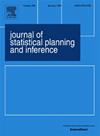Variable selection in high-dimensional varying coefficient panel data models with fixed effects
IF 0.8
4区 数学
Q3 STATISTICS & PROBABILITY
引用次数: 0
Abstract
To address the challenges of variable selection in panel data models with fixed effects and varying coefficients, we introduce a novel method that combines basis function approximations with group nonconcave penalty functions. By utilizing a forward orthogonal deviation transformation, we eliminate fixed effects, allowing us to select significant variables and estimate non-zero coefficient functions. Under certain regularity conditions, we demonstrate that our method consistently identifies the true model structure, and the resulting estimators exhibit oracle properties. For computational efficiency, we have developed a group gradient descent algorithm that incorporates a transformation of the penalty terms. Simulation studies reveal that nonconvex penalties (SCAD/MCP) outperform the Lasso across various performance metrics. Furthermore, compared to existing methods, our approach significantly reduces false positives (FPs). To demonstrate the practical applicability and effectiveness of our method, we present an analysis of a real dataset.
固定效应高维变系数面板数据模型的变量选择
为了解决固定效应和变系数面板数据模型中变量选择的挑战,我们提出了一种结合基函数逼近和群非凹惩罚函数的新方法。通过利用正向正交偏差变换,我们消除了固定效应,允许我们选择重要变量并估计非零系数函数。在一定的规则条件下,我们证明了我们的方法一致地识别了真实的模型结构,并且得到的估计器显示了oracle属性。为了提高计算效率,我们开发了一种包含惩罚项变换的群梯度下降算法。仿真研究表明,非凸惩罚(SCAD/MCP)在各种性能指标上都优于Lasso。此外,与现有方法相比,我们的方法显著降低了误报(FPs)。为了证明我们的方法的实用性和有效性,我们给出了一个真实数据集的分析。
本文章由计算机程序翻译,如有差异,请以英文原文为准。
求助全文
约1分钟内获得全文
求助全文
来源期刊
CiteScore
2.10
自引率
11.10%
发文量
78
审稿时长
3-6 weeks
期刊介绍:
The Journal of Statistical Planning and Inference offers itself as a multifaceted and all-inclusive bridge between classical aspects of statistics and probability, and the emerging interdisciplinary aspects that have a potential of revolutionizing the subject. While we maintain our traditional strength in statistical inference, design, classical probability, and large sample methods, we also have a far more inclusive and broadened scope to keep up with the new problems that confront us as statisticians, mathematicians, and scientists.
We publish high quality articles in all branches of statistics, probability, discrete mathematics, machine learning, and bioinformatics. We also especially welcome well written and up to date review articles on fundamental themes of statistics, probability, machine learning, and general biostatistics. Thoughtful letters to the editors, interesting problems in need of a solution, and short notes carrying an element of elegance or beauty are equally welcome.

 求助内容:
求助内容: 应助结果提醒方式:
应助结果提醒方式:


